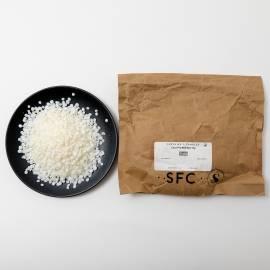The United Kingdom’s vegetable waxes market is poised for steady expansion, with projections indicating a compound annual growth rate (CAGR) of over 2.0% through 2035, according to a recent report from IndexBox. This upward trend reflects increasing demand across various industries, including cosmetics, food processing, and pharmaceuticals, where natural and sustainable ingredients are gaining prominence. Market analysts highlight the role of rising consumer awareness and evolving regulatory frameworks as key drivers fueling the sector’s growth in the coming years.
UK Vegetable Waxes Market Projected to Expand Steadily Driven by Rising Demand for Natural Products
The UK’s vegetable waxes market is on a steady growth trajectory, propelled by an increasing consumer shift towards sustainable and natural products. Heightened awareness of environmental impact and health benefits associated with plant-based alternatives have been pivotal in boosting demand across various industries, particularly cosmetics, food coatings, and packaging. Market players are responding by expanding their product portfolios to include organic and ethically sourced waxes derived from soy, carnauba, candelilla, and other vegetable sources.
Key factors influencing this upward trend include:
- Growing vegan and organic cosmetics segments demanding non-animal-derived ingredients.
- Regulatory support encouraging biodegradable and eco-friendly materials.
- Innovations in food preservation utilizing vegetable wax coatings for shelf-life extension.
- Rising consumer preference for sustainable packaging solutions over synthetic waxes.
| Segment | Estimated CAGR | Primary Application |
|---|---|---|
| Cosmetics & Personal Care | 2.5% | Natural lip balms, lotions |
| Food Industry | 1.8% | Fruit & confectionery coatings |
| Packaging | 2.2% | Biodegradable wraps and coatings |
Key Industry Segments and Regional Trends Shaping the Future of Vegetable Waxes in the UK
The UK’s vegetable waxes market is predominantly driven by cosmetics, pharmaceuticals, and food industries, each harnessing the unique properties of these natural waxes to meet sustainability demands. Cosmetic manufacturers, in particular, are leveraging vegetable waxes as key ingredients in natural and organic skincare products, propelling demand in premium segments. Meanwhile, pharmaceutical applications are expanding as vegetable waxes serve as eco-friendly excipients and coating agents. Additionally, the food industry increasingly incorporates these waxes for coating fruits and confectionery, contributing to improved shelf life and appeal.
Regional dynamics in the UK reveal that South East England and Greater London remain hotspots for research and development, supported by clusters of innovative start-ups focused on bio-based materials. In contrast, the Midlands and North West regions are emerging as manufacturing hubs due to access to raw botanical materials and advancing green technologies. This geographical segmentation underpins a diversified supply chain, fostering resilience and encouraging localized investments.
- Cosmetics: 42% of total vegetable wax consumption
- Pharmaceuticals: 28%, growing at 3.1% CAGR
- Food Industry: 22%, driven by natural preservatives
- Other Applications: 8%, including candles and polishes
| Region | Key Sector | Growth Focus | |||||||||||||
|---|---|---|---|---|---|---|---|---|---|---|---|---|---|---|---|
| South East England | R&D, Cosmetics | Product innovation, sustainability | |||||||||||||
| Strategic Recommendations for Stakeholders to Capitalize on Emerging Opportunities Through 2035
To effectively leverage the anticipated growth in the UK’s vegetable waxes market, stakeholders should prioritize innovation in sustainable sourcing and product development. Focusing on eco-friendly production methods will not only align with increasing environmental regulations but also appeal to a growing base of conscientious consumers. Collaborations between manufacturers and agricultural suppliers can help secure reliable, high-quality raw materials while reducing costs. Additionally, expanding research into bio-based wax applications beyond cosmetics-such as in food packaging and pharmaceuticals-could unlock new revenue streams and enhance competitive positioning. Key strategic actions include:
To Wrap It UpAs the UK’s vegetable waxes market marches toward a projected compound annual growth rate of over 2.0% through 2035, industry stakeholders are closely monitoring evolving consumer trends and technological advancements. This steady expansion underscores the growing demand for sustainable and natural ingredients across various sectors, including cosmetics, food, and pharmaceuticals. With sustainability at the forefront, the market is poised to attract increased investment and innovation, shaping the future landscape of vegetable wax production and application in the UK. |




